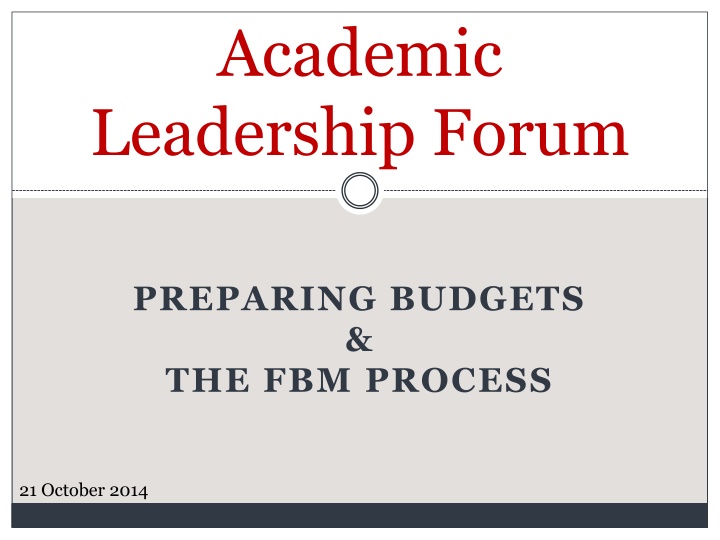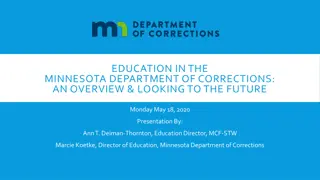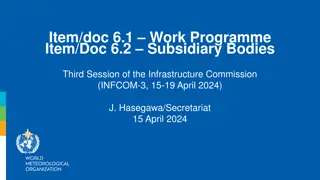
Academic Leadership Forum: Budgeting and University Revenues Overview
Explore the big picture impact of academic units on university revenues, understand the budget process, and delve into the total operating expenses and revenues for a comprehensive view of financial planning in academic institutions.
Download Presentation

Please find below an Image/Link to download the presentation.
The content on the website is provided AS IS for your information and personal use only. It may not be sold, licensed, or shared on other websites without obtaining consent from the author. If you encounter any issues during the download, it is possible that the publisher has removed the file from their server.
You are allowed to download the files provided on this website for personal or commercial use, subject to the condition that they are used lawfully. All files are the property of their respective owners.
The content on the website is provided AS IS for your information and personal use only. It may not be sold, licensed, or shared on other websites without obtaining consent from the author.
E N D
Presentation Transcript
Academic Leadership Forum PREPARING BUDGETS & THE FBM PROCESS 21 October 2014
Budgeting for Your Unit 2 REAL DEL DEGAN INTERIM DIRECTOR OFFICE OF THE BUDGET 21 October 2014
Content 3 The Big Picture Impact of academic units on University revenues Building the University s budget Academic units and the budget process
The Big Picture: Total Operating Revenues estimated at $768.8M for FY2015 4 $ 000 Short-term investments, 3,007, 0.4% Endowment investments, 1,913, 0.2% Tuition and student charges, 254,468, 33.1% MESRS- operating grant, 361,202, 47.0% Gifts and bequests, 5,240, 0.7% Sales of Goods & Services , 117,530, 15.3% FICOR, 25,400, 3.3%
The Big Picture: Total Operating Expenses estimated at $775.8M for FY2015 5 Pay Equity Phase 2, 6,350 , 0.8% $ 000 Special Projects, 9,000 , 1.2% Academic Salaries, 227,129, 29.3% Non-Salary Expend., 150,819, 19.4% Net I/F Transfers out , 54,500 , 7.0% Benefits, 81,718, 10.5% Admin & Support Salaries, 208,664, 26.9% Student Salaries, 9,985, 1.3% Student Aid, 27,623, 3.6%
The Big Picture: Financed Accumulated Deficit Outlook 6 140,000 120,000 100,000 80,000 in $'000 60,000 40,000 20,000 0 Apr-14 Apr-13
Building the Universitys Budget See handout 7
Impact of academic units on University revenues 8 Enrolment changes Research - Indirect costs of research - CRC / CFI allocation calculations Endowments / Gifts Specific grants / contracts / community service
Major Revenue Components 9 Enrolment Changes Provincial Grant Tuition
Academic Units and the Budget Process 10 Faculty-level (not directly with academic departments) Each Faculty can adopt its own specific budget process The Agreement Reached with each Faculty stating: priority investments, targets, and proposed new initiatives Multi-year and ALL funds Involves performance measures Not just incremental
Academic Units and the Budget Process 11 Faculties prioritize requests from their academic units NOT done directly by the Provost s Office
Priority-focus of the Agreement: Open, Connected, Purposeful: McGill and the Next Five years Student Life and Learning Research Engagement A Learning Organization Space
The Agreement: What s new for the FY16 exercise? Draft agreement documents stipulated between the AP(BR) and the Faculties (or Admin units) - No template - No dropdown menus and formatted sections - No responses to documents just one document Meetings between AP(BR) and units to culminate with a signed agreement by end of November/early December Integrating with other planning processes: - Enrolment targets - Academic Renewal - Space, IT, etc.
The Agreement: What can units expect for FY2016? Previous year s budget +/- allocations for the new year Cuts from the MESRS will continue: No indication of changes to the tuition framework assume rules remain unchanged No changes to FIO (ancillary fees) framework
Budget allocations: What can an academic unit expect? 15 Allocations are to Faculties, not directly to academic departments Faculties each adopt their specific budget allocation rules Some allocations provided: - Academic Renewal - Salary Policy - Benefits - Enrolment Driven Allocation - Indirect Research Cost Allocation - CFI LOF envelope (for wet lab areas) - CRC allocation - Graduate Student Support (through GPSO) - Funding for specific initiatives (priority pool envelopes)
Academic Renewal 16 Target complement for each Faculty TT salaries covered by central Related allocations include: - Start-ups - Endowed chair contributions - Provostial hires - Salary award incentive contribution - Contribution to recruitment costs - Moving expenses (including immigration fees) - French courses Funds for salaries revert to the central pool when TT staff depart - http://www.mcgill.ca/provost/files/provost/academic_renewal__hr-budget_feed_1-oct- 2012.pdf
The Financial Budget Model (FBM) 17 CRISTIANE TINMOUTH INTERIM ASSISTANT VICE-PRINCIPAL FINANCIAL SERVICES
Managing the Budget and year-end results 18 Dean has statutory responsibility for the Faculty s budget But, Chairs definitely have a role Results (positive or negative) are carried forward to the next fiscal year Positive carry forwards in 1A funds (unrestricted operating) are put into a reserve at the Faculty level Use of the reserve funds require permission from the Provost
The Financial Budget Model (FBM) The Financial Budget Template is used for submitting the agreed upon multi-year and multi-fund planning has an Excel-based tool capturing all revenues and expenditures per org provides an overview of the spending capacity on a multi-year, multi-fund basis (e.g., provision of carry forward for future expenditures) allows a financial plan aligned with the Agreement is aligned with the Budget Book and Financial Statements must be completed by the Faculty Financial Officer with input from various Faculty/Unit members, upon request - - - - - - Enables stewardship and management of all fund types Allows for variance analysis: Budget allocations vs. Actuals by account grouping -
Planning with the FBM Forecasting is not an exact science a projection into the time period(s) under consideration based on assumptions, previous experiences, and reasonable expectations FFO must consult with VP, Dean, Chairs, Directors, professors, others for input be familiar with your Unit s historical data (prior year actuals) have supporting documentation and estimates proactively seek information from professors, researchers and fund holders plan for the use of carry-forwards and ensure that these are included the Agreement Remember that the FBM must cover 3 fiscal years of budget includes ALL fund types - - - - - - - - - -
Variance Analysis Reports for Variance Analysis with: - Recording of changes relative to the Budget (e.g., Academic Renewal Plan) - Adjusted Budget (if applicable) versus Actual - Actual to Actual Enables a more accurate analysis of the financial situation Close coordination with FFO/FST
Resources and Support FBI website: www.mcgill.ca/fbi FBI reports: http://www.mcgill.ca/fbi/support/reports- tools FAQ s :http://www.mcgill.ca/fbi/faqs fbi.budget@mcgill.ca
Other Highlights PCard default FOAPAL - Tri-Agency funds will no longer be accepted as default funds - Requires an alternate default fund for all Pcards - Communications are going out and most successful to date Picture Receipts - Change in procedure for Research Grants and Contracts only - Effective 15 November 2014, all expense claims submitted on research grants/contracts must include original receipts for reimbursement - Capturing pictures of receipts with an iPhone is not considered an acceptable substitute for original receipts when charging research grants and contracts
Questions for discussion Can my unit increase its enrolment-driven budget by accepting more graduate students? Are there resources available to fund teaching for new graduate programs? What mechanisms in place for funding the development of new initiatives and programs?
Enrolment-Driven allocation 25 - Current allocations for FTE changes for regulated students: Faculty Agric & Env Sc Arts CCE Dentistry Education Engineering Law Management Medical Residents Medicine MSE Music Relig. St. Science Ugrad $3,500 $2,400 $2,400 $9,000 $2,400 $3,000 $2,400 $2,400 Masters $6,000 $4,000 $3,600 $6,000 $4,000 $5,000 $4,000 $3,600 $4,000 $6,000 $4,000 $5,000 $4,000 $6,000 PhD $11,000 $7,500 $11,000 $7,500 $11,000 $7,500 $7,500 $3,500 $3,000 $3,500 $2,400 $3,000 $11,000 $7,500 $7,500 $11,000
Questions for discussion Unionization is increasing our costs for TAs and possibly lecturers, but our budgets are not increasing. What can we do? My unit pays a number of course lecturers, and McGill s hourly rates are not as competitive as some of our neighbours . How can I best manage this situation?
Questions for discussion Is budget-interpretation training offered to new chairs/directors? What are chairs/directors expected to do when it comes to reviewing budget reports and statements?



